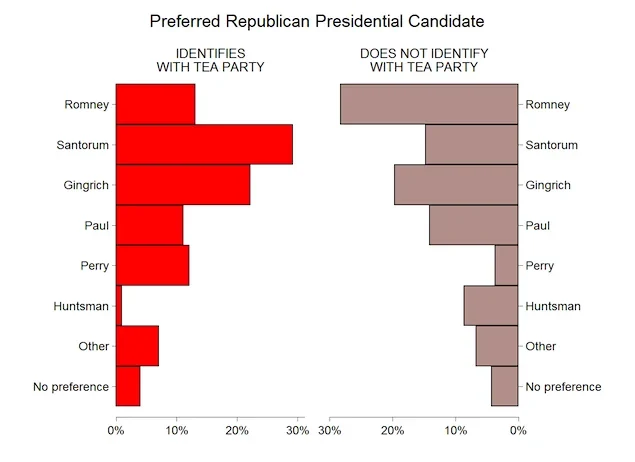Matt Bai's piece on Sunday nicely illustrated how divided Tea Party activists are about the Republican presidential contenders. Are the findings from his interviews with activists mirrored in polling data? Yes. And this tells us something about whether and how the Tea Party will matter in 2012.
In a January 7-10 YouGov poll, respondents were asked two questions about the Tea Party:
The first question spotlights "Tea Party identifiers," while the second spotlights "Tea Party supporters. The former are much less numerous than the latter: only 13% of the sample are identifiers, while 31% somewhat or strongly support the movement.
Among respondents intending to vote in a GOP primary or caucus, Tea Party identifiers tend to to support one of the "conservative" candidates. (I use the quotes because some -- e.g., Ezra Klein -- have argued that Romney's platform is itself fairly conservative.) About 22% support Gingrich and 29% support Santorum. Only 13% support Romney. Among those who don't identify with the Tea Party, Romney receives a plurality of the vote (28%). Here's a graph:

This illustrates what Bai found: although many Tea Party identifiers do not support Romney as their first choice, they do not agree on the alternative.
Among Tea Party supporters, views of the candidates depend on how strongly one supports the Tea Party. Among those likely GOP primary voters who strongly support the Tea Party, 77% are also identifiers. And their opinions about the candidates mirror those of the identifiers: they are split, with a tendency to support one (but not the same one) of the conservative candidates. So 28% support Santorum, 16% support Gingrich, and 10% support Perry. About 20% support Romney.
But Romney wins the plurality (29%) of those who "somewhat support" the Tea Party, most of whom do not identify as Tea Party members. And he wins the plurality (27%) of those who neither support nor oppose the Tea Party. (Very few likely Republican voters, 9%, oppose the Tea Party.)
So how are Tea Party sentiments shaping the views of the Republican primary candidates? It's clear that those most involved in the movement -- identifiers or strong supporters in this survey; actual activists in Bai's interviews -- want someone other than Romney. But they can't agree on whom. Meanwhile, those who support the movement less strongly or are ambivalent lean toward Romney, although not in overwhelming numbers.
In 2010, the Tea Party appeared to help Republican candidates, as best as we can tell with the available data. But it's a much more open question whether the Tea Party's energy and enthusiasm can be mustered for 2012, especially if Romney is the nominee. Complicating the picture -- and this is nicely illustrated in Bai's article -- is the lack of organizational coherence within the Tea Party itself. In May 2010, I wrote:
I think that point holds up well in 2012.









